Kevin Moranz | Privateer Power
Share
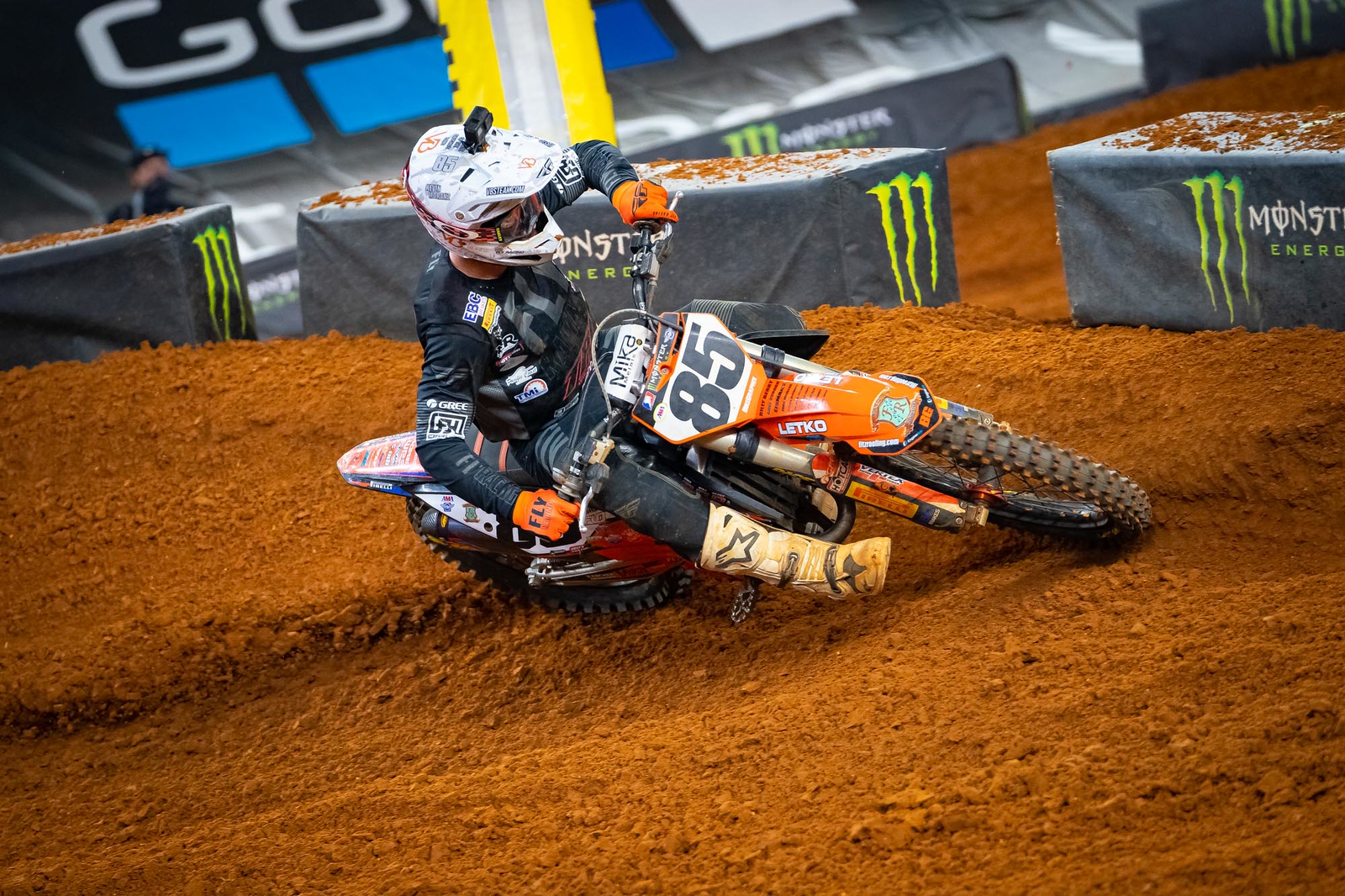
INSTAGRAM | @moranz.85
INSTAGRAM | @racetechinc
www.racetech.com
www.kevinmoranz.com
Kevin Moranz is a perfect example of a privateer motocross racer. A full-time competitor in the Monster Energy Supercross Series and Lucas Oil Pro Motocross Championship, Moranz has made significant improvements in his results over the last three years and is one of the few to line up for Main Events in the 250 West Coast region and 450 Class this year. The Kansas native’s progress has been easy to follow through the 2021 season and he’s spent the last few weeks in battles for position against OEM-supported riders (it started with a 250 LCQ win-ninth place 250 Main Event finish at Houston Two and continued with laps led in the 450 LCQ at Arlington Two).
Moranz knows that proper funding can be just as important to a racer’s career as on-track results, and he’s created an assortment of self-managed sponsorship packages since turning pro in 2018. Support from FLY Racing and Monarch Heavy Haul helped him hold a spot under the TPJ awning, partners like Race Tech and Letko Cycles provide technical support, and one-off helmet wraps and Paetron fans put money in his pocket.
For our first installment of Privateer Power, we rang up Moranz and asked him to explain the program in the most casual manner possible. The 45-minute conversation touched on lots of topics, including his interactions with businesses, his plans for the future, and how a series of challenges last winter put the 2021 season in jeopardy.
I’ve been around you for a while, came out to the house in Topeka last autumn, and have always noticed how you have a program put together. How did all of this come together? Because you have a unique deal for an individual guy, having all of the sponsor and marketing deals set up, and an online presence. What gave you kind of the blueprint to do things the way you’re doing them?
It all started when I was a kid, racing in the amateurs and trying to go to Loretta’s every year. Long story short is we only ever did Loretta’s every year, but we never did any of the crazy big races, never went to Mammoth or anything like that. We only did one Area Qualifier, one Regional, and the Loretta’s because I was going into public school and we didn’t have the funding to go do all that stuff. I played football, wrestled, and did other activities. When I was ready to go pro, moved to the A Class and started racing for money, my parents sat me down and were like, “Yeah, you’re doing good and moving in the right direction. But if you want to really take this to the next level and travel all over, you’re going to have to step it up when it comes to funding it yourself or get creative with sponsors.”
And that’s what I really pride myself on. I’ve been pretty much covering all my expenses and the cost of my whole program since I was about 16 years old. It stemmed from needing a way to support my own racing and keep racing because it’s a love and a dream of mine. Honestly, I started going from business to business around my hometown and Topeka, and at that stage, I was more asking for money, like what privateers usually do.
With everything that I’ve developed over the last five years, I don’t go to people and ask for money anymore. I actually show them why they should join my team and what benefits they get out of it, instead of the normal privateer program of, “Hey, can you help me with this X amount of dollars to get me to go race?” With me, if you give me this X amount of dollars, you get your logo on the jersey and on the bike, you get a helmet wrap, you get marketing videos, you get a bunch of different stuff.
I mean this as sincerely and nicely as possible, so don’t take this as like a jab or anything, but you’re one of most normal motorcycle riders, with upbringing and everything else, of the guys that I see at the track. You have a very ordinary background, from public school to going to college to living in a normal house in Topeka with your parents.
[Laughs] And I absolutely love it. I would not change it for a thing because it’s required me to be creative, I’ve learned a lot, and I’m hungry. I want to continue getting better and receive more support instead of just having my parents pay for everything, because that’s not a backup plan for me; it’s not a realistic backup plan, at least. This requires me to succeed. I get creative. You know, there are some kids that just aren’t as passionate and aren’t as motivated, and they don’t really care if they get a couple extra bucks because they know the parents will pay for it. For a guy like me, we always got to get these sponsorship dollars so we can sleep in a hotel or something, or else we’re sleeping in the van.
Okay, kind of a chicken or the egg question here, but what has helped more: your interest in motorcycles sponsorship programs after you had to go out and get the money, or being a college marketing student?
I learned tenfold more about marketing from the experience of doing my own program compared to what I learned in college. I’m just going to be really honest because I got my Associates’s Degree online, and anybody who’s taken classes online understands that a good majority of them are BS classes. They’re not all exactly what you want to learn, and that’s just straight-up college. When you’re taking Appreciation of Art, all these electives that you have to take to get your degree, it’s a waste of time, and to me, it was frustrating, but I knew I wanted to do it because I wanted to get that Associate’s Degree and I wanted those 60 credit hours that I could transfer that towards a bachelor’s if I wanted. But no, I’ve learned way more from just the experience of life than what I’ve learned in school.
Did you go to school interested in the marketing programs because of motocross, or was it something that came up?
Not really. I have a lot of interests, and maybe they feed off of each other. Going through grade school and high school, I mowed lawns instead of going out and working at McDonald’s or places a lot of my friends did. I worked for myself because I understood if I got the work done and worked hard, I could make more money than if I was just going for minimum wage at McDonald’s. I think it’s always been a mindset of mine, and I want to work for myself in the future or own my own business, work with real estate and flip houses. The whole idea of going to college for marketing just kind of played off of each side. Later in life I want to work for myself and create my own income, but I wanted to learn how to market myself better in the motocross industry, so it worked for both reasons.
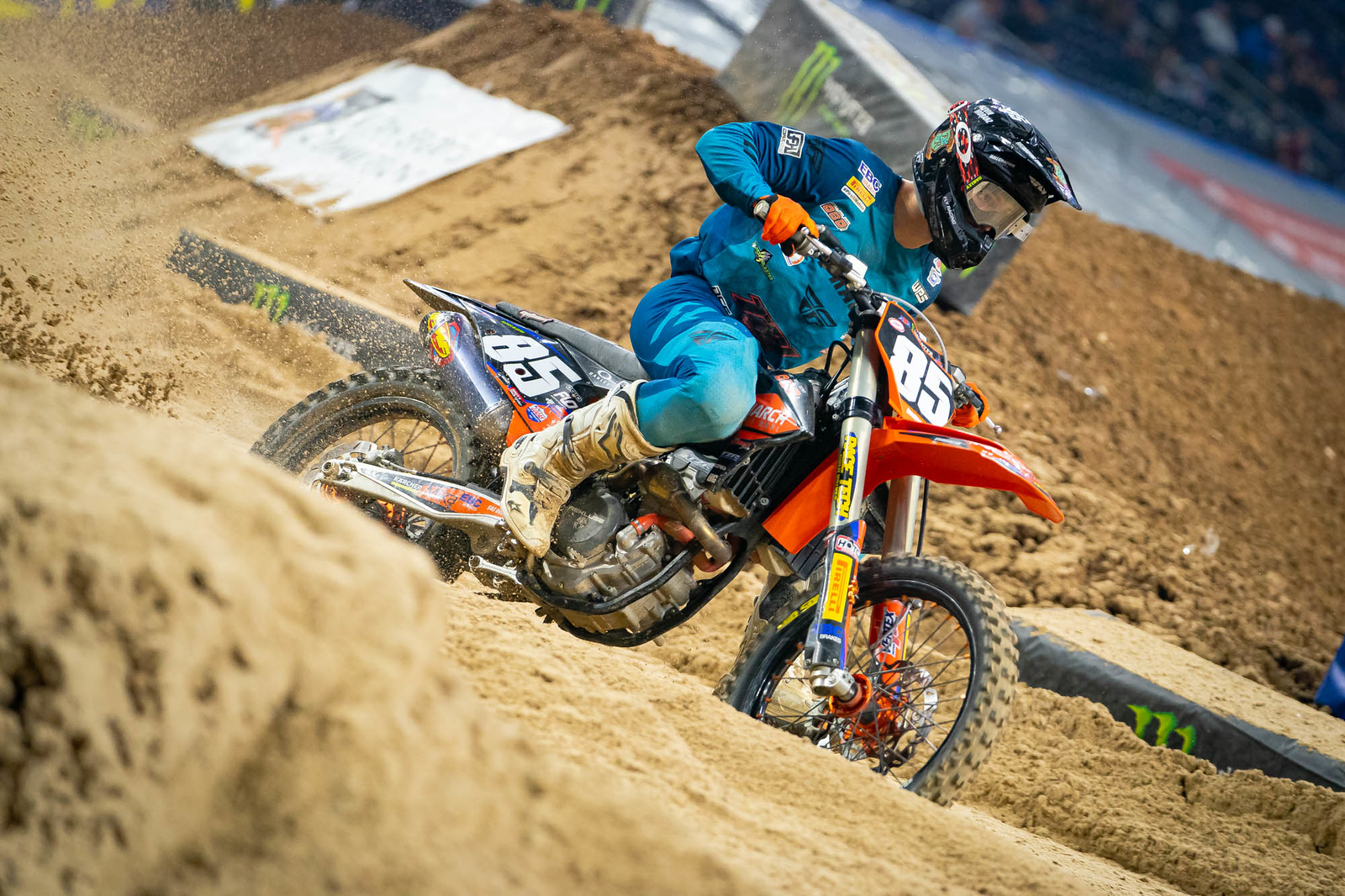
“I learned tenfold more about marketing from the experience of doing my own program compared to what I learned in college… I knew I wanted to do it because I wanted to get that Associate’s Degree and I wanted those 60 credit hours that I could transfer that towards a bachelor’s if I wanted. But no, I’ve learned way more from just the experience of life than what I’ve learned in school.”
When you go to potential sponsors, be it an industry brand like FLY Racing or a non-industry guy like Monarch Heavy Haul, you show them actual core data from the programs. “If we do this and this, it will be a successful thing,” rather than, “Hey, we’re going to throw a logo on the bike, and it’s going to be cool.” Do they react positively to that? Is it something that they’ve never seen before?
I’ve had so much positive feedback with everything going on because these businesspeople, who were in my shoes at one point to an extent, understand that when you’re young, usually you’re dumb. They really respect the fact that I’m not necessarily young and dumb, but that I’m young and I kind of have my shit together. They respect that, and it’s really helped me get a lot farther because they understand that I’m in it for the right reasons. I’m always finding new ways to keep people involved and keep people feeling like they’re part of the team instead of just paying to be on the team.
One of the things that really helps is that RC knows you pretty well because you spent time at his place, and Jeannie trained you. How was it to get into that program? And how is it to know that one of the top people in the history of the sport knows that you’re out doing legit work and that he brings you up to other people?
It’s pretty cool, man. If you’d told me when I was like 10 or 12 or even 15, “Hey, you’re going to be training with Ricky Carmichael.” I would have just said like, “Oh yeah, yeah! I wish!” The opportunity I was given and make it happen is thanks to a lot of great people that were behind me at the time. Dude, it’s cool, and it’s nice to have that relationship with Ricky and get those little shout-outs on TV and stuff like that.
Okay, this is one thing I’ve always wanted to talk about. The perception of racing pro motocross is either you’re a multimillionaire, or you’re broke, that you have almost nothing and barely making it from race to race. To some, they think it’s either one or the other. Very few people realize that a lot of you are somewhere in between. Even myself, I’m 30 years old and make a very comfortable living, but it’s nothing extravagant or anything like that; I know where I am on the totem pole.
You know where you’re at on the totem pole. You can make enough money to make this worth your while. Nobody is making you race, but you’re also not out there struggling all the time. You know that as you get better, more money will come in. You’re know that you’re not going to come in at 19 years old, with nothing to show, and make like 120 grand the first year.
No, absolutely not. Even referring back to like last year and the year before that, yeah, it’s been a struggle. It’s still not easy, it’s still a struggle today, especially having problems with bikes and traveling and having problems with vans and stuff like that. It all adds up. That’s why I’ve taken time in the offseason to invest in different programs to go back into my racing, and that’s really the biggest thing.
I have gotten more professional with it, and I would have to say this has been a really big year for me, results-wise and program-wise. I did all the helmet wrap stuff last year, and this year I’m doing helmet wraps up, graphics, jerseys, and getting on Patreon with fans involved. It would take hours to tell you all the stuff that I had going on in my program.
It is a personal thing. It’s you living out the dream of being a racer, but also you have to put the business hat on and understand when the business is not doing well in certain areas, you have to make the necessary changes to make it profitable. You can’t bleed money day after day.
Yes, exactly. And I absolutely love doing it. I love running my own program, talking to these people, trying to more or less sell my programs, and explain why I’m worth the investment and what they’re going to get back out of it. It’s so fun to me because five years ago, I was going from business to business in Topeka, and everybody just told me no. Dude, you get so many “nos” that it just tears at your heart. To finally be at a point where things are going good, year after year after year, bringing new things into the program, and it’s starting to take off, it’s really exciting.
You’re 23, right?
No, I’m 21.
That’s a very advanced mindset because there are dudes in their late 20s and early 30s that are just now kind of figuring out the stuff you figured out already.
And by no means is this all because my parents paid for it. Obviously, my goal is to be financially stable when I’m, you know, an adult, but I would not change anything about my upbringing. You give me a hundred chances to redo it, and I would not change a thing. If I had the opportunities a lot of the kids I saw and raced with, those bikes and the campers and the training, I would not be where I am today. I would not have like the hunger to improve like I do today.
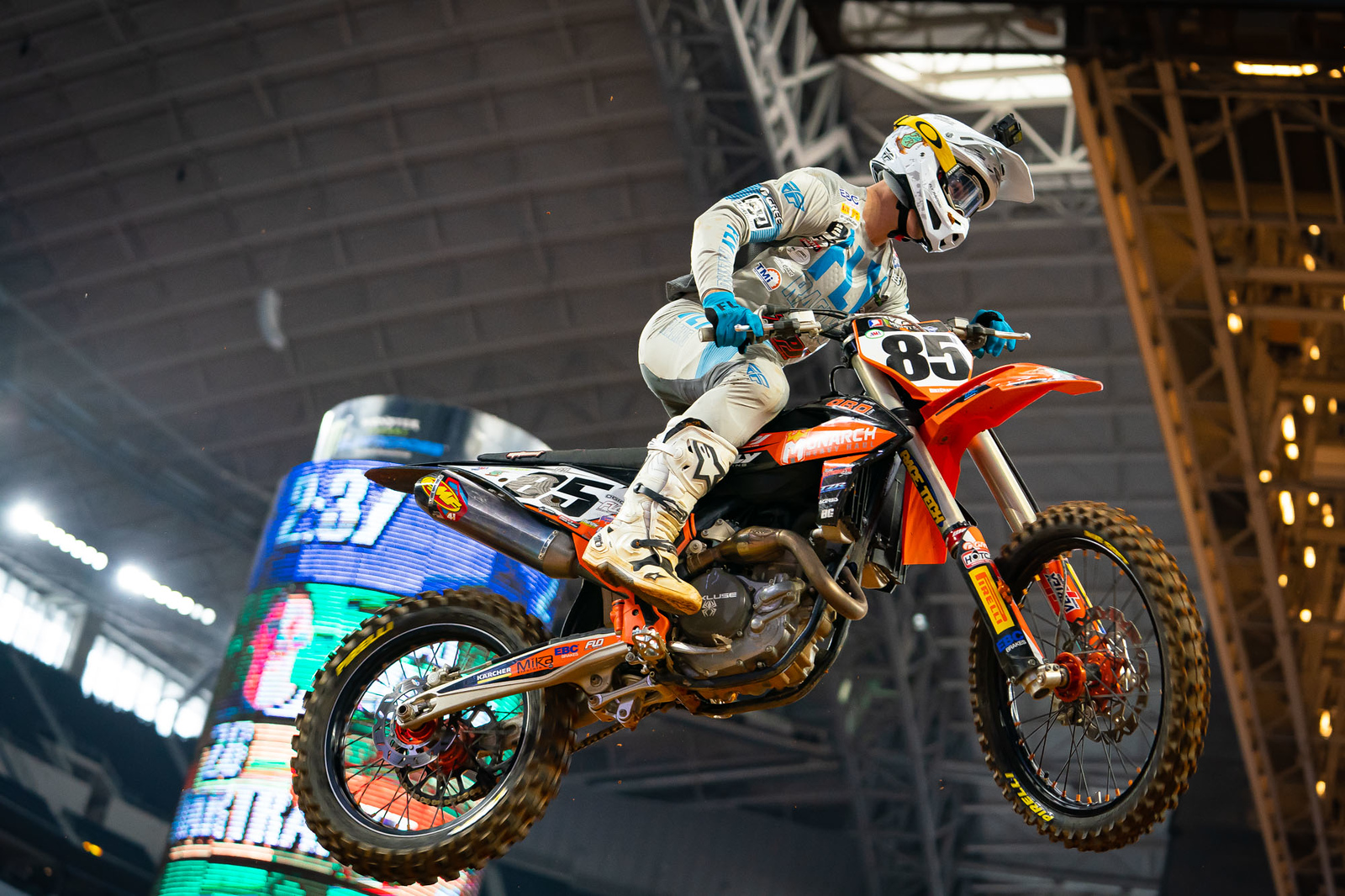
“I love running my own program, talking to these people, trying to more or less sell my programs, and explain why I’m worth the investment and what they’re going to get back out of it. It’s so fun to me because five years ago, I was going from business to business in Topeka, and everybody just told me no. Dude, you get so many “nos” that it just tears at your heart. To finally be at a point where things are going good, year after year after year, bringing new things into the program, and it’s starting to take off, it’s really exciting.”
Fast-forwarding to the racing stuff. I came to Claremore for those two Hoosier Arenacross races, and you were ripping. Those were a warmup for Supercross, which is what a lot of people do with Arenacross. How is it to run those local races and make a little bit of money? Because that series pays pretty well, and that’s more money you can invest and save for when you follow the Supercross series.
Yeah, exactly. You get $500 per win at the Hoosier Arenacross, and you get an extra $500 if you sweep all four mains over the two nights. When I won at Claremore, everyone said, “Dude, you just made 2,500 bucks!” Both nights I won both mains, and everybody was talking about how I was making money. I was like, “You have no idea. That $2,500 went towards only partially paid for the A Kit forks on my 450 this year.” That’s a hundred percent where I put that money. It’s nice to have those races because it’s a little confidence booster and to clean house with the gnarly dudes that were there was very gratifying. It kind of gets you in the flow with gate drops, but hopefully, you just stay away from the carnage.
Have you ever done the European races or not?
I raced in Germany in 2019.
Okay, so you know, it’s a similar thing over there, too. I’ve been to those races, not the German ones, but I’ve been to enough of the European stuff that I know how it goes. It’s a cool place for you to get some gate drops and make some money, but it’s a completely different test of your skills. The dirt is different, the racers are different, everything is different.
Yeah, exactly. And some of those tracks are these sketchiest; they are literally like video games, you’re landing on the backside of jumps that are vertical. The dirt is like Play-Doh and the traction there is unreal.
You crashed at Claremore and had to take some time off, and just as everything was kind of coming back together, you had another separate incident. Give us a rundown of everything that happened from the middle of November until the start of the season.
My goal was to be training by December 1st, so in November, I got everything together. I raced my 2020 practice bike at the Claremore rounds, went back home, and had to frame that bike the next night and put it all back to stock because I had to sell it. I was down to one bike, but my goal was to get new bikes by the beginning of December, so I could get those setup and ready to train for Supercross. I was told I would get a bike by December 1st, but with COVID and everything, that didn’t happen. The next Hoosier Arenacross race was around December 15th in Claremore, and I was like, all right, I guess we’ll just take the bike I rebuilt and am trying to sell because I don’t have any other bikes. In the first main event of the night, there was some carnage in the first corner in front of me, and I couldn’t do anything, So I ended up going right into it. It was nothing crazy, but it beat me up and I needed to take a little bit of time off. That set me back two weeks, but I went up to Letko Cycles and got all my new bikes after the Claremore race.
I went to TZR to get the race bike built in Illinois. We got the bike done at 9:00 PM one night, and because I had a 10-hour drive, I hit the road and tried to get a couple of hours in. About an hour and a half in, I absolutely smoked a deer, just completely clobbered it. I actually had a cop right behind me, so he saw it, and I had to limp it to the Walmart right after that because he wasn’t going to let me drive any farther. I slept there thinking how I had to figure all this out and get my van fixed; I didn’t know how insurance was going to work because I’ve never dealt with insurance, I didn’t know what was about to happen. My whole idea of Supercross was just falling apart with one thing after another, but that night I was like, all right, we’ll just get up in the morning and push through.
I get up the next day, and the van was dead because I left lights on. I couldn’t see the lights that were on because they got destroyed by the deer. I had to do charades outside to get jumped, and nobody would help me because it was COVID. And I guess I looked scary for whatever reason. I don’t know how I kid my age in a sweatshirt and sweats looks like danger, but nobody decided to help me. Finally, I got jumped by a Mexican fellow who did not speak English, but thank goodness for him, and he’s the only one that helped me. I got home, but it took two weeks for the insurance to get figured out, and I couldn’t hit the road and leave without them inspecting the van. I only got five days of Supercross riding in before round one.
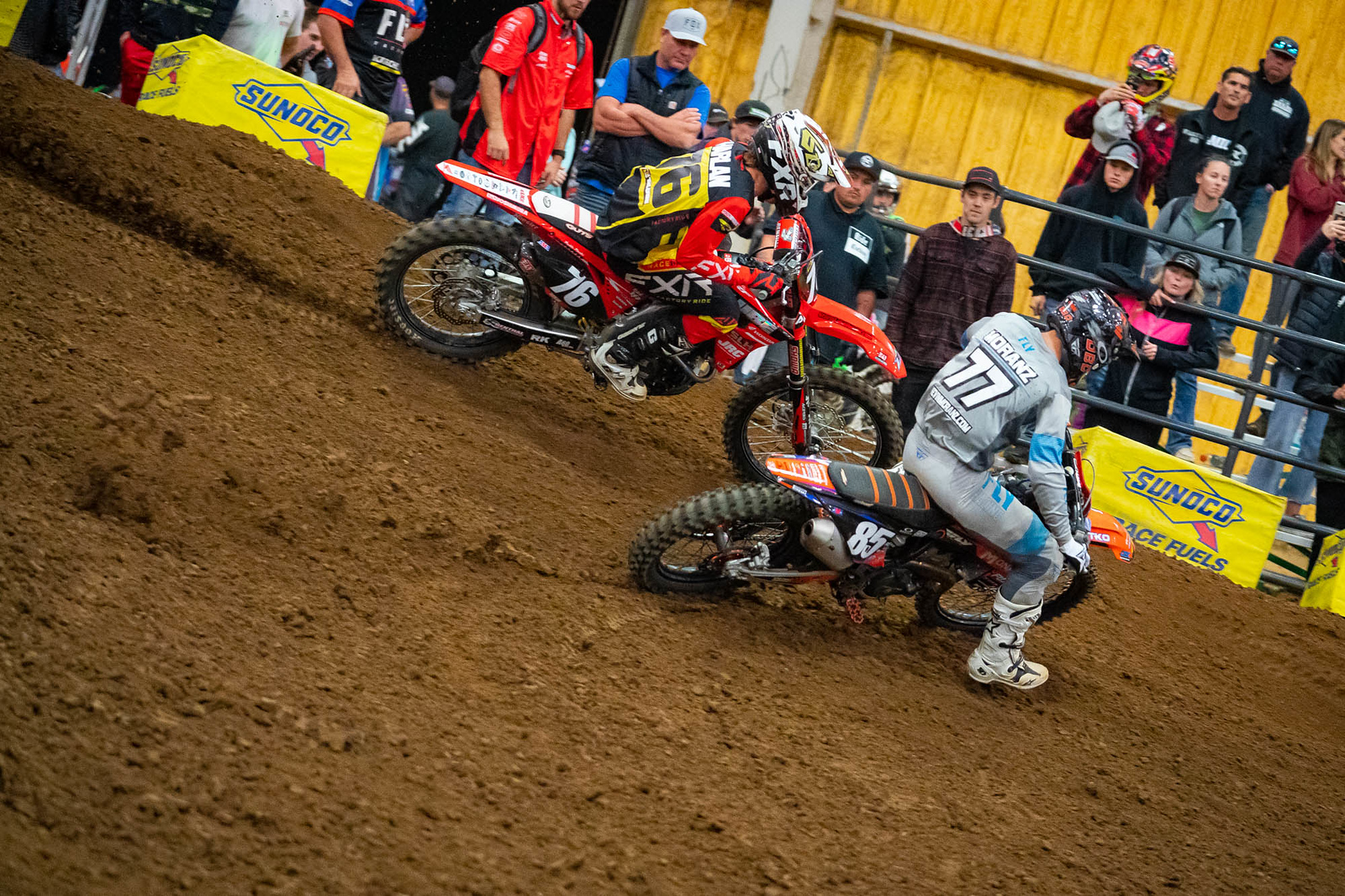
Moranz lined up for the Hoosier Tire Arenacross Series late last year, swept the Pro Class in one weekend, and pocketed $2500. “Everybody was talking about how I was making money. I was like, ‘You have no idea. That $2,500 went towards only partially paid for the A Kit forks on my 450 this year.’ That’s a hundred percent where I put that money. It’s nice to have those races because it’s a little confidence booster and to clean house with the gnarly dudes that were there was very gratifying.”
How has it been like for you to be in these race situations on the track? You’re getting holeshots, going to the first turn with factory bikes, doing that consistently. It shows that there has been progress in your program.
I had very minimal prep, and my stamina was not where I want it to be, but my speed and comfort were on a different level from last year. My starts have always been good, but I just believe that I should be there. And being really honest, I don’t give a rat’s ass about what bikes next to me; I know my skill off the start, my reaction, and my speed are better, and it gives me a lot of confidence. I’m how happy with how I’m doing everything, going out and finding support, because I have a lot of good people behind me, and it helps my headspace, my confidence, and my speed. It’s really nice to be getting the results that I am.
You started out in the 250 West Coast region, but you’ve jumped to the 450 Class during this break and have kept racing. And that gets you seat time and experience that will help racing the 450 Class this summer during the Nationals.
Yeah, exactly. I had a lot of conversations last offseason about where I can train, how much it’s going to cost, and the facilities that I had on my radar were expensive, especially for somebody that’s trying to do it on their own as a privateer. To get the TPJ/FLY Racing team behind me and Monarch Heavy Haul to step up and help me do all 17 rounds is a no-brainer. I’m going to be promoting my sponsors and the people that support me more if I’m racing, it gives me some more seat time, and when we can just go race every weekend, I don’t have to spend that money paying somebody to ride on the track. It’s a triple whammy for me.
Do you have someone within the industry or the pit area you go to for advice or guidance? You’re not the first guy to do it this way, so there have to be guys you could talk to.
I have people in my corner who support me, but when it comes to a mentor or somebody I go to for advice, there’s really not. I have Kris Fagala; he takes me to the line and is like our mechanic and helps us with our faith in our team and whatnot. I would say he’s a mentor when we’re just talking about everything I have going on with my program and my racing and everything. But when it comes to time management, getting my bikes together, the business deals, and everything, it’s kind of just me. That’s what I’ve learned over the last five years and what I’m very happy about. If there are ever questions I’m nervous about or need to ask, I don’t really have an answer for you on who I would go to for that, but I know there are good people out around that would help me.
When you’re at the races, do you have people from other teams or companies come up to you? Do you have a lot of attention from the industry?
Yes and no. Specifically on race day, especially with the COVID stuff, I’m focused on myself. I get a lot of messages, and lately, there are a lot more companies interested in trying to get on board with my programs and my website, KevinMoranz.com. But in the pits, it’s not as busy as what you’d maybe expect.
I like that you’re a guy that still has a website set up. That was an old school thing, and back in the day, every rider had their own website set up. Now guys think if they just have social media, that’s enough, but it’s really not. You need a way so somebody can search your name and everything comes up in one place, instead of just a barrage of Instagram posts or whatever. Give everything a plug really quick, so if people want to get in touch with you to do some sponsorships stuff, they know where to go.
If you want to just like reach out for a helmet wrap or a one-time opportunity kind of thing, you can hit me up on Instagram, or my email is kevmoranz46@gmail.com. But yeah, I literally spent weeks building the whole website by myself. A part of my website is the “Join Moranz Racing” tab. If you go to the website and hit join Moranz Racing, it gives three different options. You can either support as a sponsor and get logos on the bike, the jerseys, promo videos, content for marketing, and stuff like that. For fans, you can be a sponsor as a fan or make a one-time donation. Fans that want to sponsor on the top tier get their first and last name on the front fender of my race bike, and other fan tiers get you signed jerseys, signed number plates, giveaways. Another big thing that I’m doing is behind-the-scenes content that’s only available for people who are Patreon subscribers and follow my Moranz Racing account on Instagram because that’s where I’m posting all that stuff. It’s a cool way to get fans and outside sponsors involved; they know what they’re getting into and what they’re getting out of the partnership.
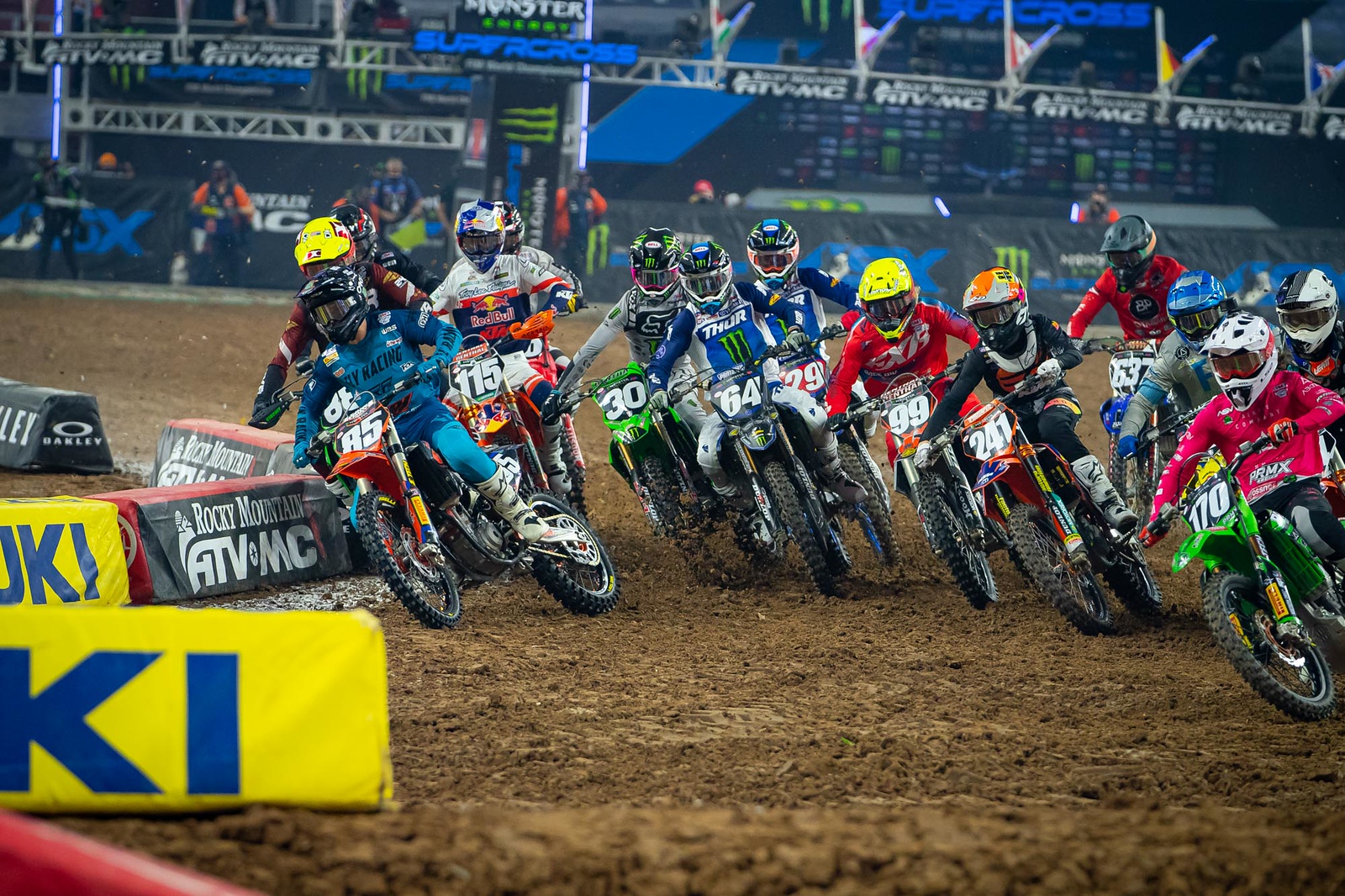
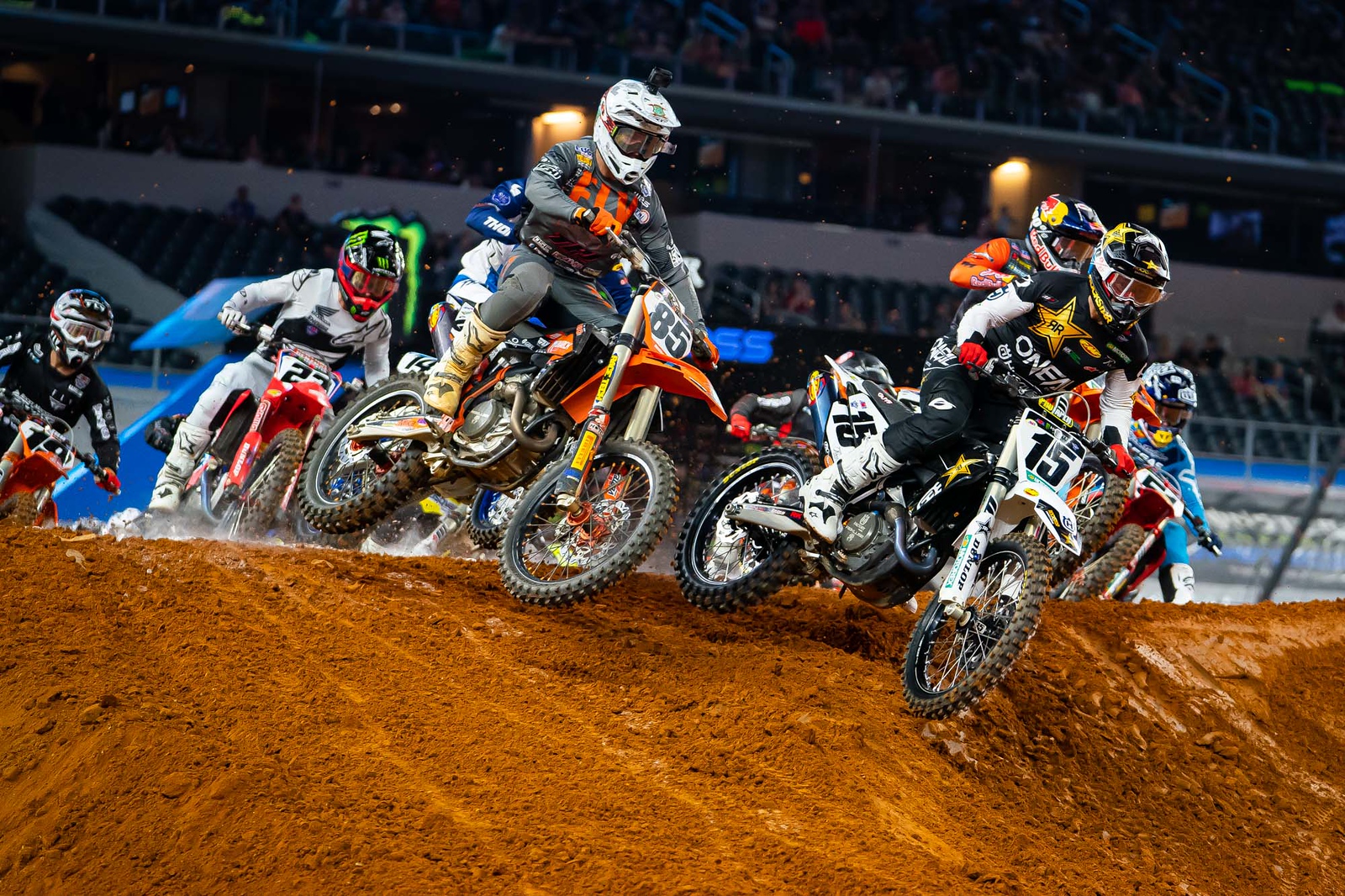
“My starts have always been good, but I just believe that I should be there. And being really honest, I don’t give a rat’s ass about what bikes next to me; I know my skill off the start, my reaction, and my speed are better, and it gives me a lot of confidence.”
You have a logo, and a lot of people have logos now, but like you’ve made it a brand identity. Where did you get that idea to have KM in the same font all the time?
Isaac Nelson started playing around with all this stuff for me, and hopefully I can start bringing clients his way when they see what kind of work he does. What he’s able to produce is a big blessing to have as part of the team.
I went to Germany in 2019, talked to the team managers over there, and they understood what I was talking about. I was building the helmet wrap program when I went over there, got their feedback, and saw how they promote the sponsors that they get. I had a lot of good conversations with them about brand identity and consistency. Their biggest sponsor was Castrol, so Castrol would be on the jersey, on the pike, on the stands, and on the toolboxes. And I was like, Well, like my biggest sponsor right now is myself, and I’m building my own program, so I need to have that same KM on the toolboxes, on the stands, on the hats, and everything to just build brand consistency. I learned that from the guys over in Germany, which is actually pretty cool.
We talk about the potential income privateers could get from selling merchandise at races. I have dozens of dirt track racing T-shirts at my house, so I know how important it is to buy the merch and support the race teams. How is it for you and to ship orders because someone wants to buy a Kevin Moranz shirt?
I think it’s pretty sweet, to be honest. When I first released the t-shirts, they moved really well, but lately, it’s been a little bit dry because I haven’t like pushed it. That I have fans and people who watch me, message me every race about my performance, and tell me good job, all the positiveness that I’ve gotten, has been really cool.
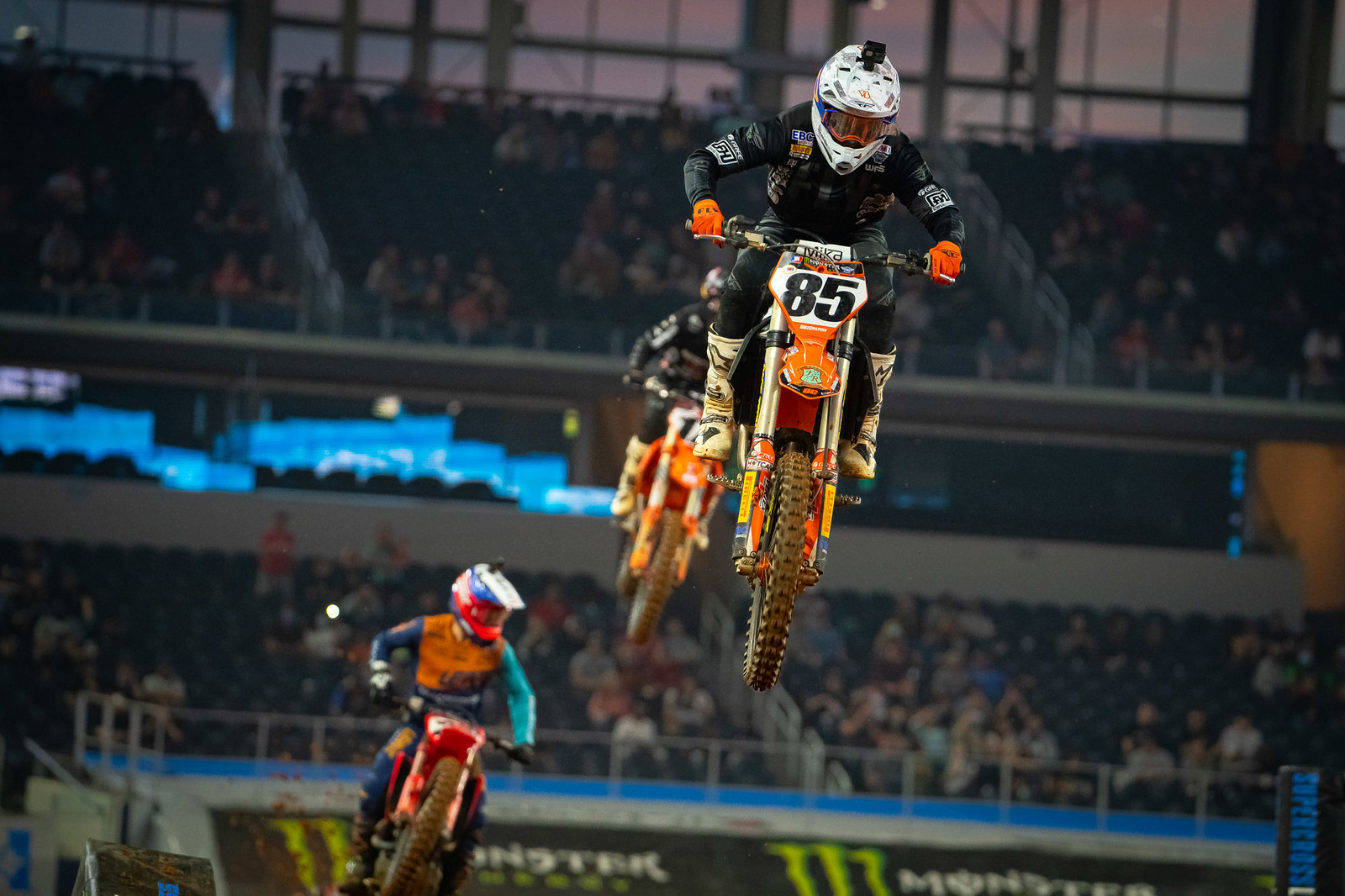
“I know it’s not for me to say that I deserve it, but I feel I deserve it results-wise and work ethic-wise. If I had everything taken care of for me like these guys, I would 100-percent outwork anybody you put me in a room with. My potential, considering where my results, starts, and speed are, if I put that to an actual training program, not just five days of Supercross riding before the season, I really do feel like my potential is way, way up there.”
Okay, last questions. Is pro racing as a career what you thought it would be? Has there been one thing you’ve never been prepared for or a challenge that you’ve had to face?
I would have to say the sheer cost of racing has been the biggest milestone, and it’s full circle on everything, because it comes back to expenses. Something I did not prepare for, but I’m very happy I am good at, is time management. Being a privateer, you have to do your bike work and training pretty much on your own. The Patreon and the extra stuff that I do, the helmet wraps, the website, the shirts, the hats, the sticker packs, and the marketing I do, takes time management. To be good at that is a big part of a good privateer program, and that’s the number one thing I had to overcome.
The brand loyalty thing that you have is important. Some guys change gear companies or have different sponsors every year, but don’t do that. It’s crucial to stick with the people that support you all the time.
And with FLY Racing, I will race for them for the rest of my career if it’s possible for me. I do not want to leave. They treat me so well, they’re such a good company, and being a part of WPS, they have a lot of other connections. It is cool to be at this point in my career. I came from having to buy only one set of gear for a whole year to the point where I’ve partnered with FLY Racing, and they help me with gear and helmets.
You’re 21 years old and have complete freedom. Do you always want to race the same way you’re doing it now, building the program you have and improving year over year? Or would you take a factory-level ride if it came along, even with restrictions and expectations?
No, I would 100-percent take the factory ride. That’s a goal of mine. And I know it’s not for me to say that I deserve it, but I feel I deserve it results-wise and work ethic-wise. If I had everything taken care of for me like these guys, I would 100-percent outwork anybody you put me in a room with. My potential, considering where my results, starts, and speed are, if I put that to an actual training program, not just five days of Supercross riding before the season, I really do feel like my potential is way, way up there.
I would take that factory ride to get myself on better equipment. Yeah, that’s what I’d do for sure. Like you said, I do enjoy the freedom I have and pretty much everything that goes along with my program, it’s very freeing and easy, and I’ve been doing it long enough now that I will continue to do it. But as soon as an opportunity arises to get on better equipment, I’m taking that. I really do want to eventually be contending for podiums and championships and stuff like that.



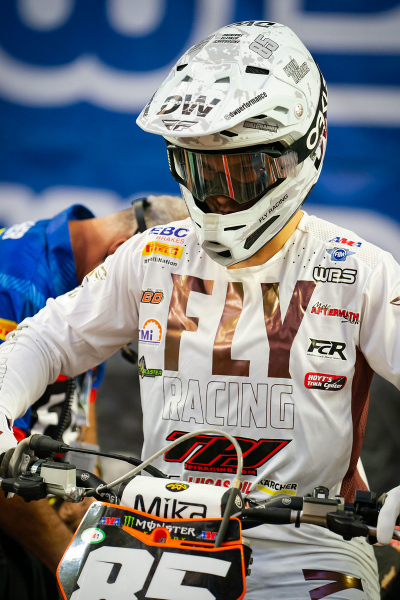
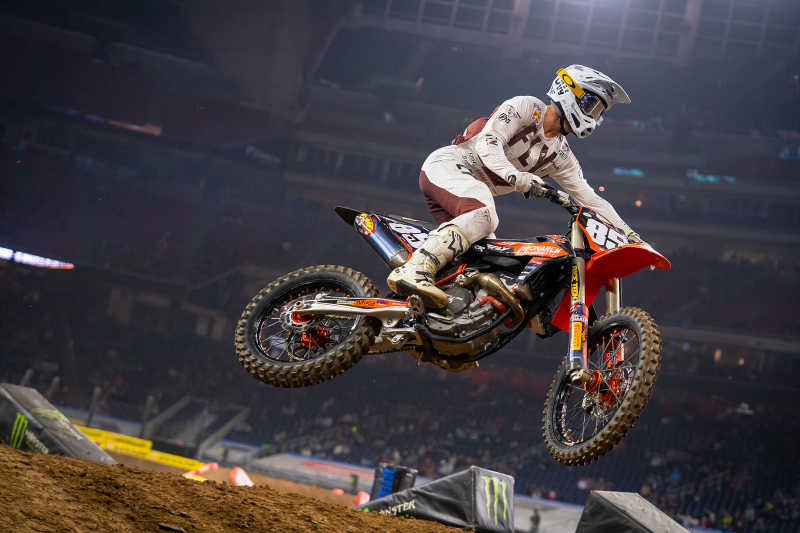
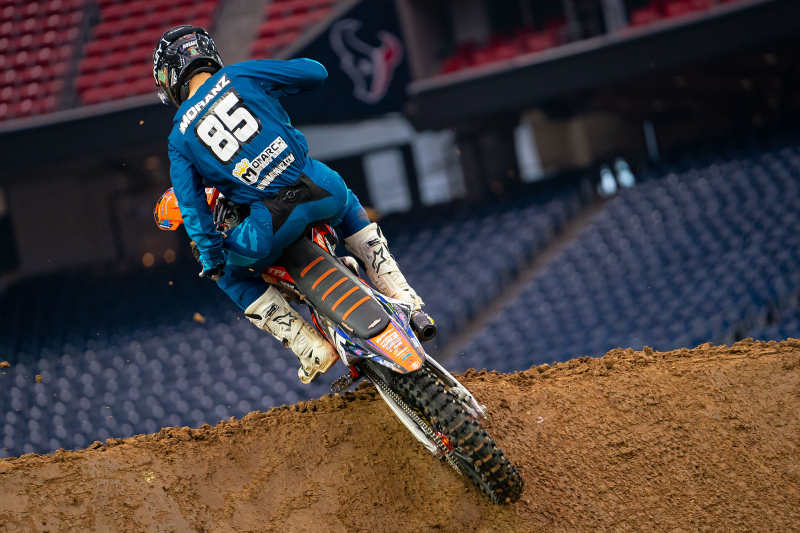
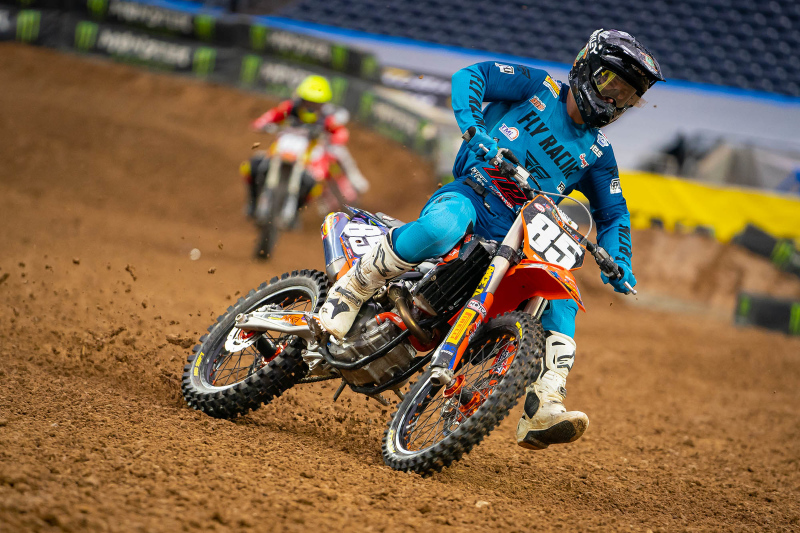
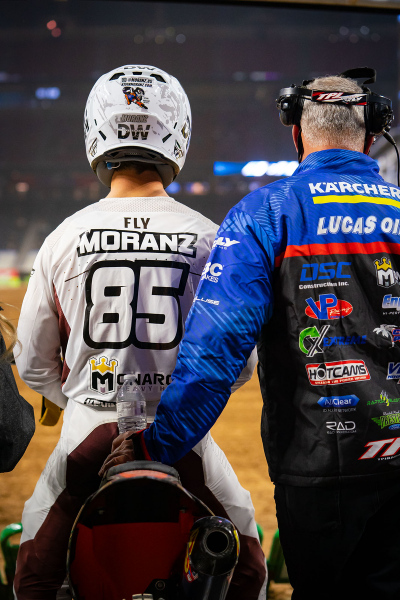
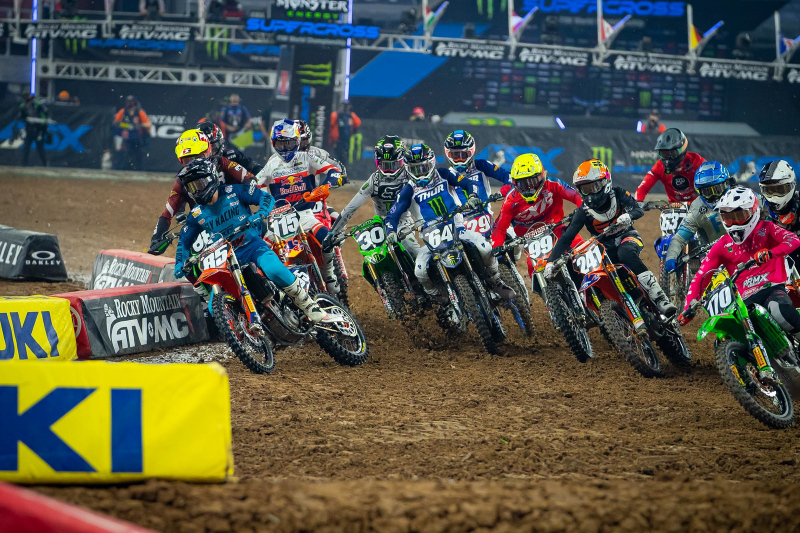
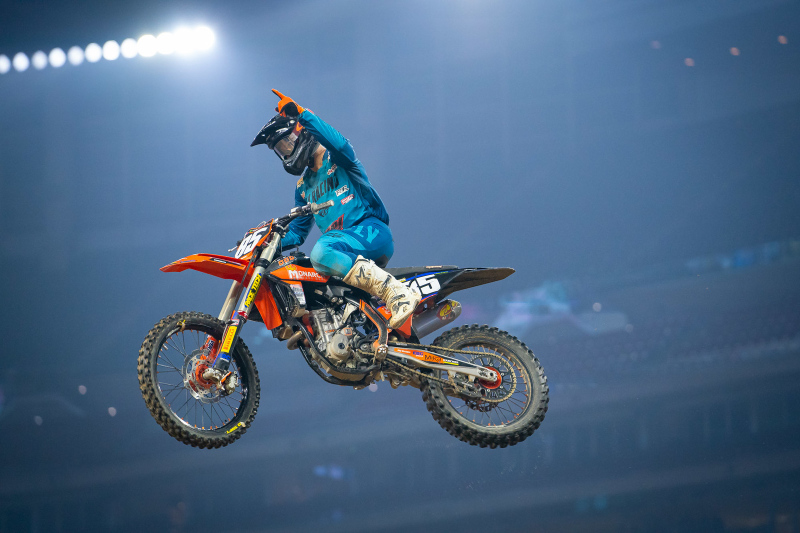
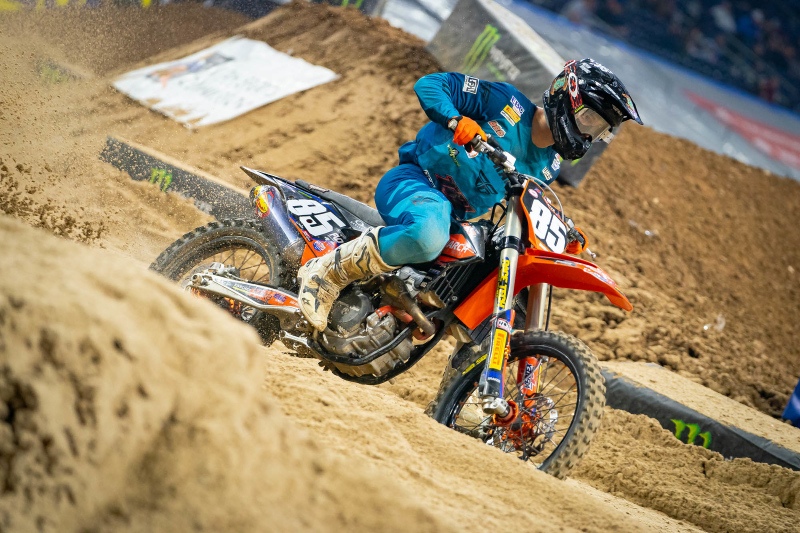
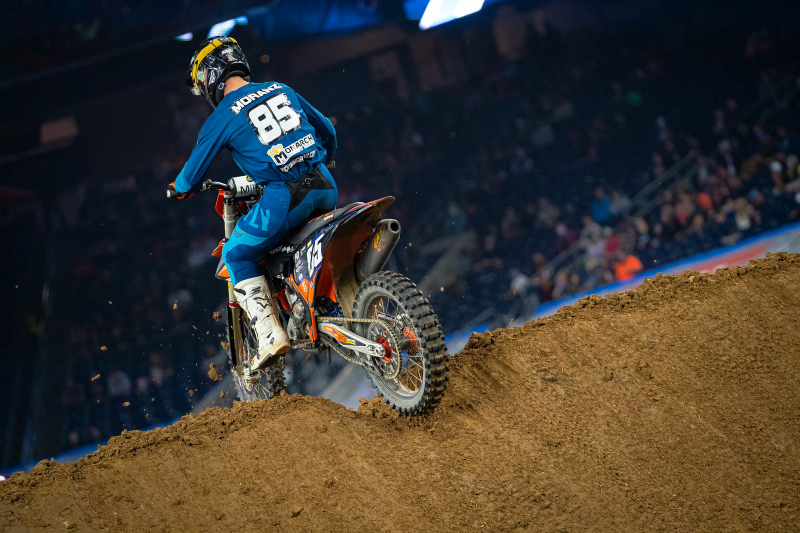
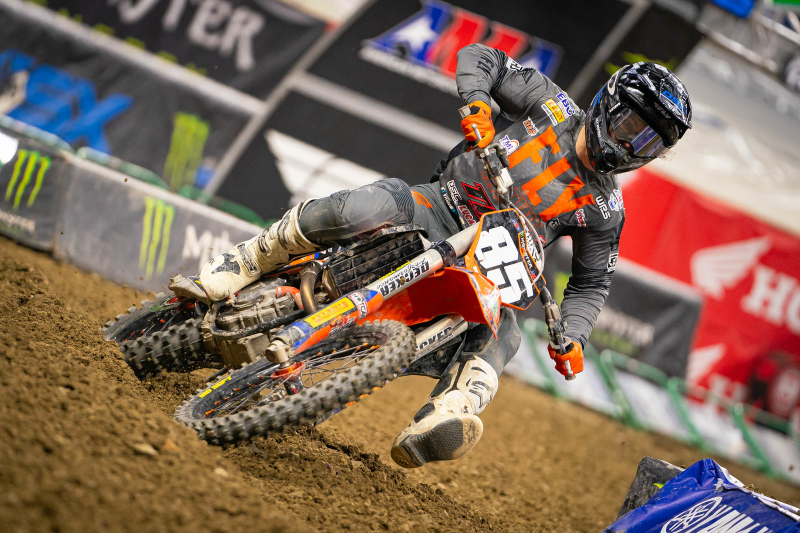
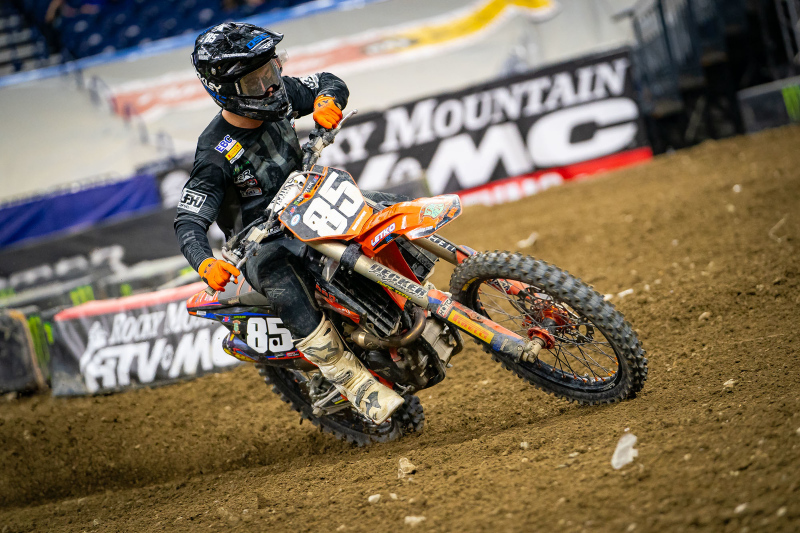
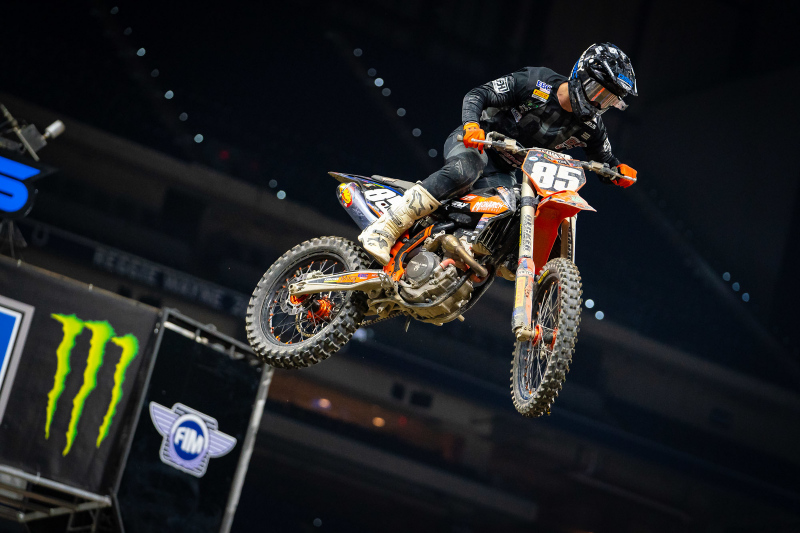
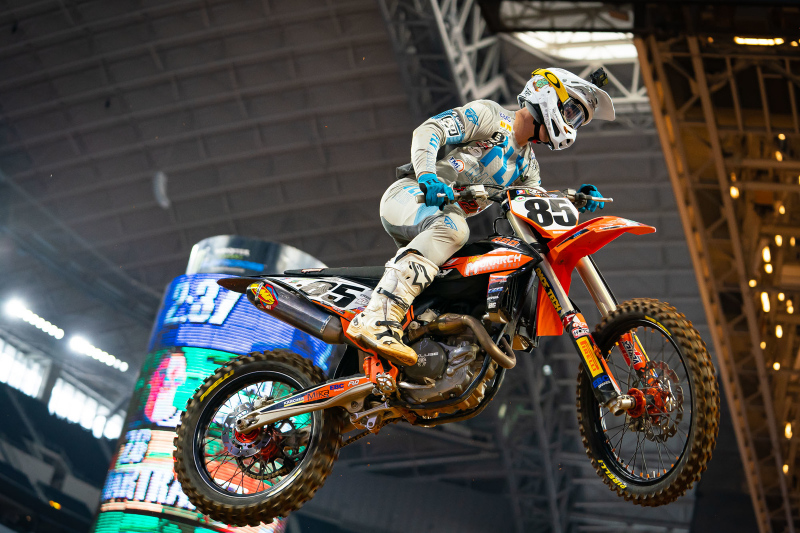
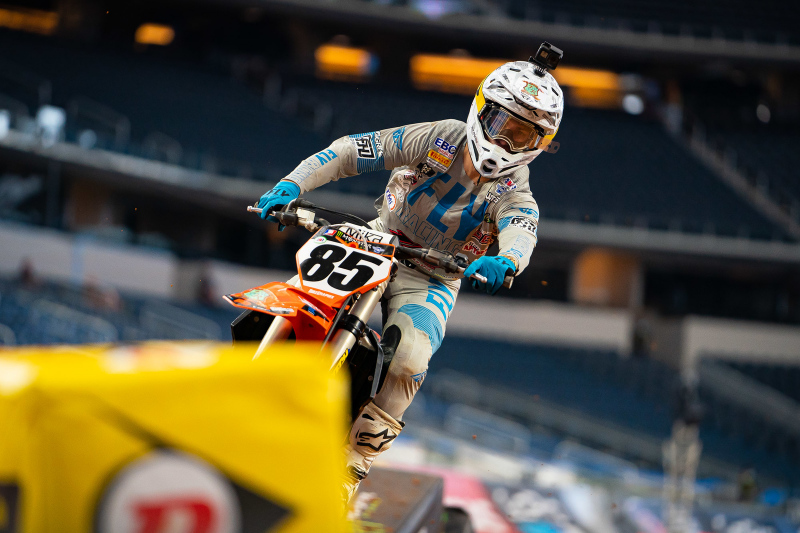
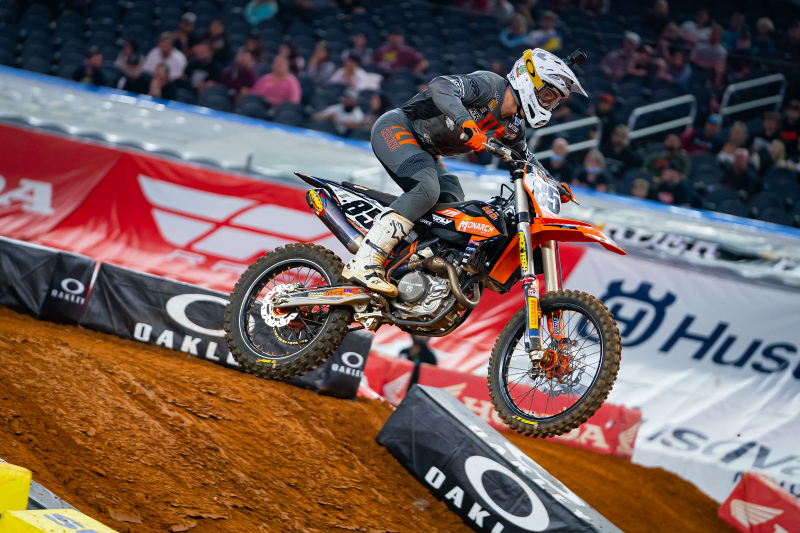
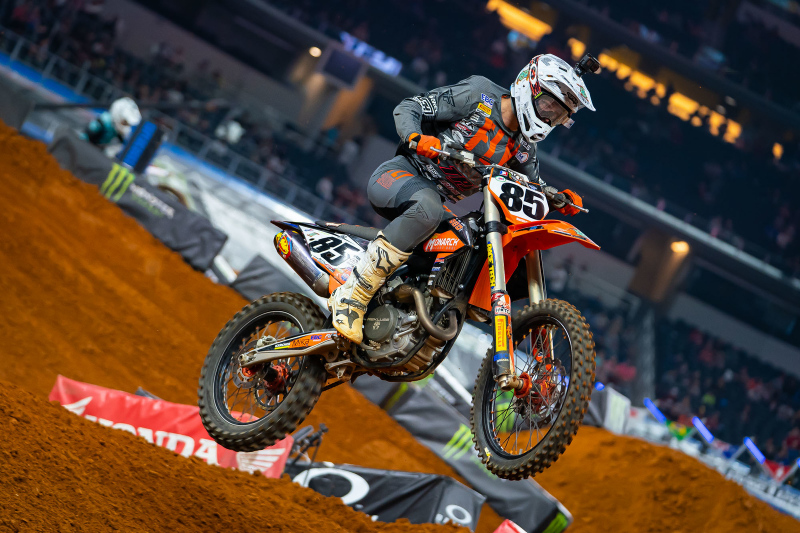
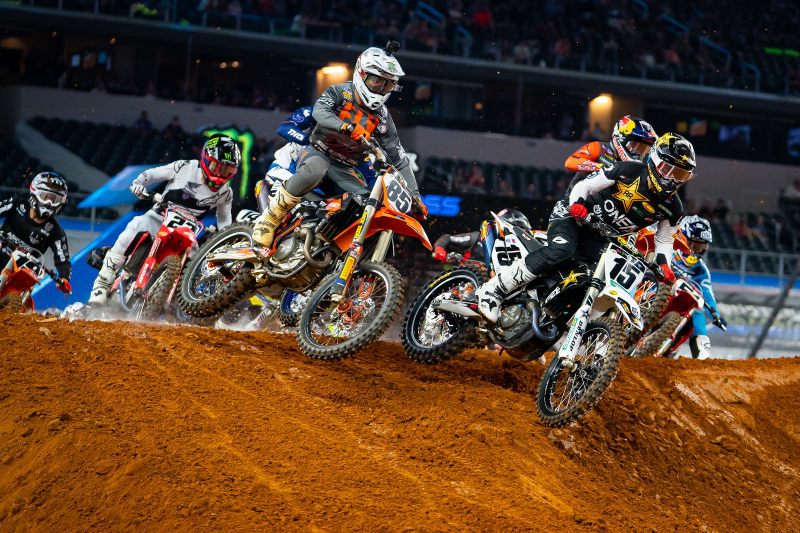
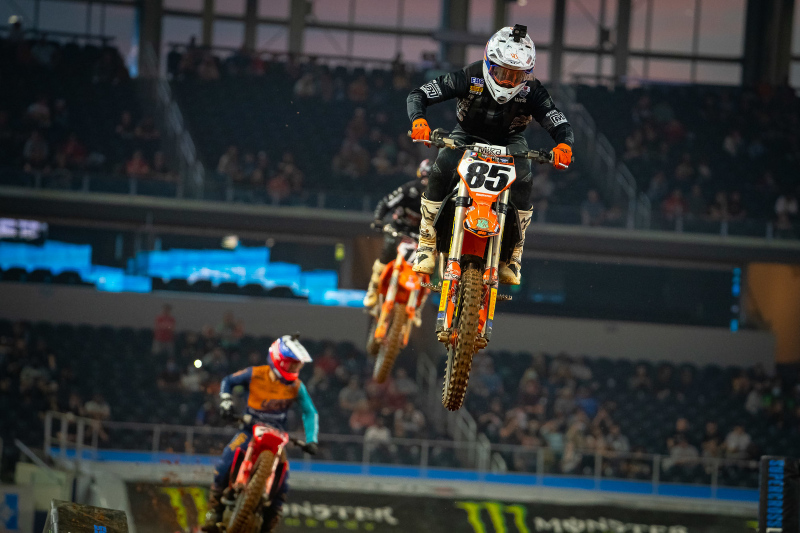
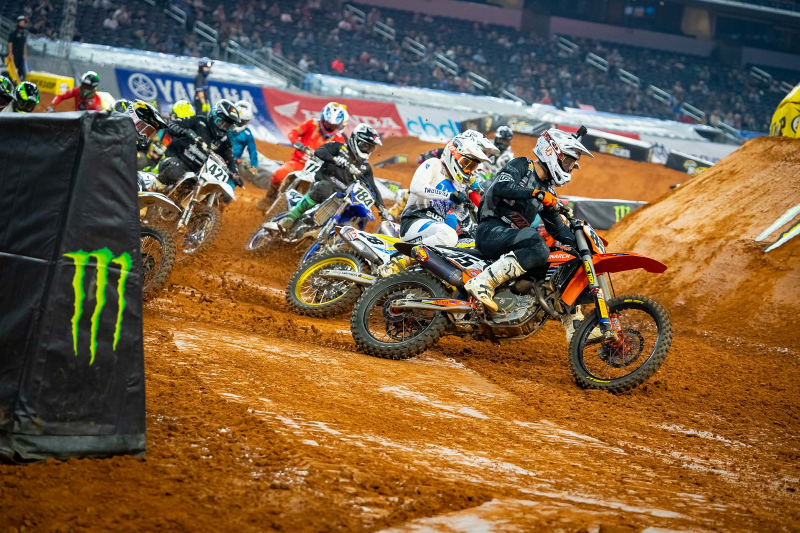
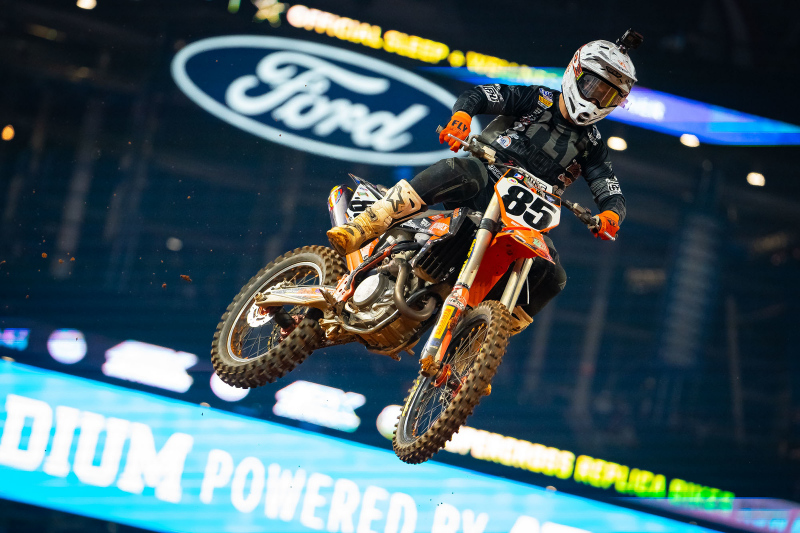
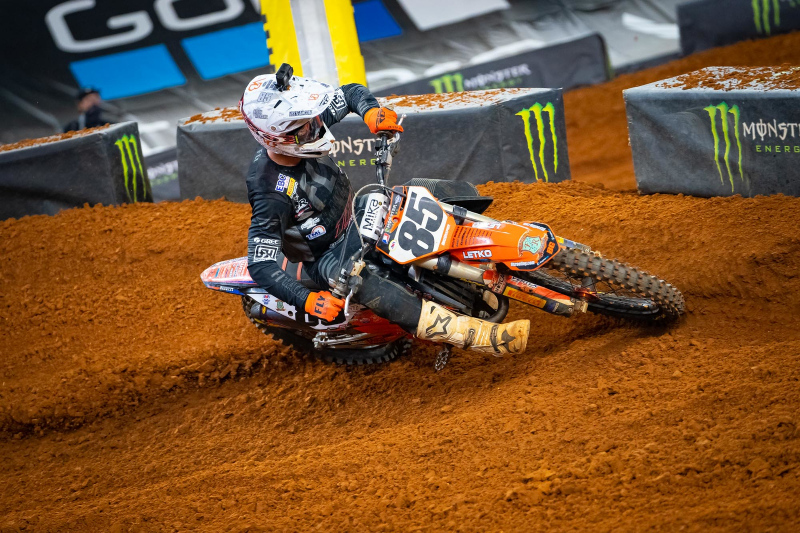































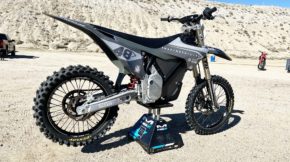



You’ve work so hard Kevin and you are a great role model for others. Your a successful business man and pro and we are proud to say we know you. Your work ethics are just like you were in football. You gave it your all. All the time